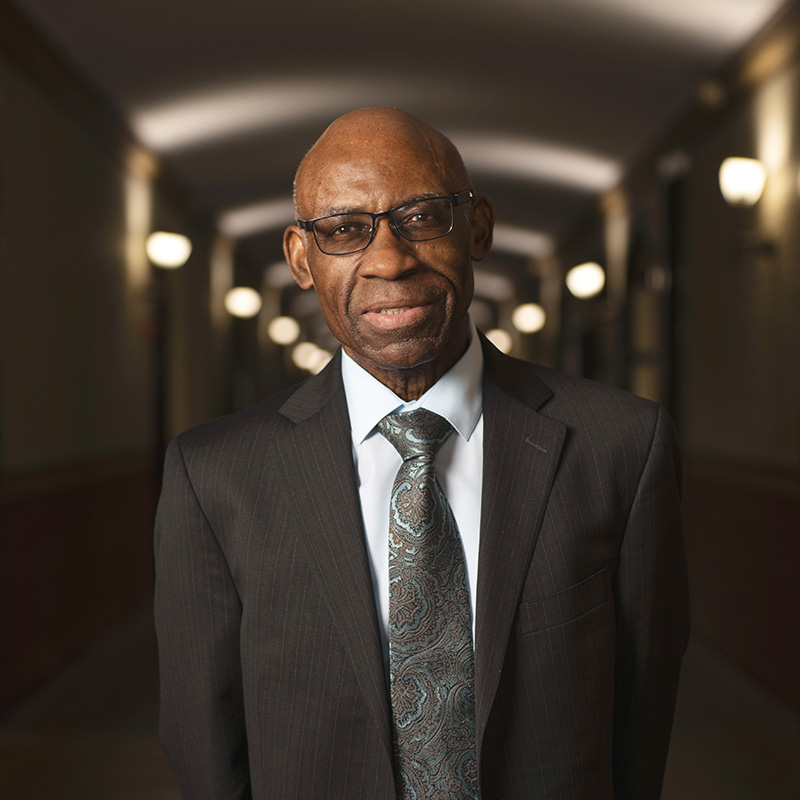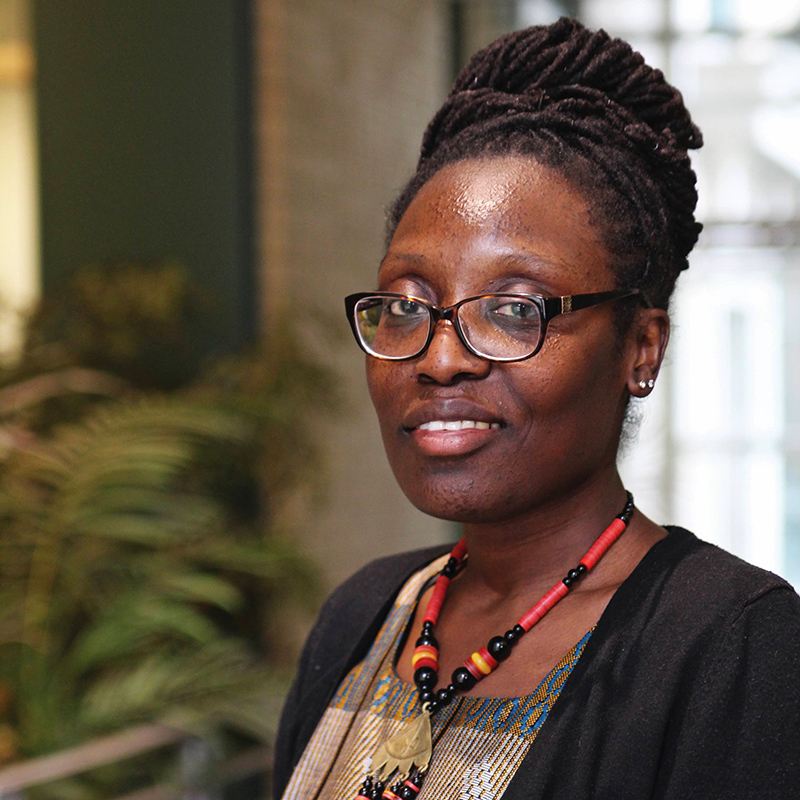Celebrating the Revelatory
Researchers dispel myths to reveal the true experiences of African Americans and French-born women of African and Caribbean descent.
By Stacy Kish
Media Inquiries- Dietrich College of Humanities and Social Sciences
- 412-268-9309
Black History Month grew from Negro History Week, which was established in 1926 to highlight the achievements of African Americans and to recognize the central role of blacks in U.S. history. While the African American experience provides a lens to understand and explore challenging issues around race, this phenomenon is not unique to the United States. Two faculty in the Carnegie Mellon University Dietrich College of Humanities & Social Sciences are raising awareness of the cultural, societal and historical experiences of blacks in the United States and around the world.
The Process Toward Democracy
 African Americans and their descendants have played an integral role in the development of the United States. Their participation, however, is often overlooked. Joe Trotter Jr., the Giant Eagle Professor of History and Social Justice, focuses on the labor contribution of African American men and women in his book, “Workers on Arrival: Black Labor in the Making of America.” His work expands on their contribution to the infrastructure and economy of the nation.
African Americans and their descendants have played an integral role in the development of the United States. Their participation, however, is often overlooked. Joe Trotter Jr., the Giant Eagle Professor of History and Social Justice, focuses on the labor contribution of African American men and women in his book, “Workers on Arrival: Black Labor in the Making of America.” His work expands on their contribution to the infrastructure and economy of the nation.
“There are a lot of stereotypes out there, like black people are consumers of goods and services but don’t produce and add value to the nation’s wealth and economy,” Trotter said. “I want to refute this perception. Over many generations, black people have contributed, often at great sacrifice, to the development of the nation.”
The 2016 presidential campaign shone a light on the struggles of the working class, but coverage almost exclusively focused on the ‘white working class’ without acknowledging that the working class is multiracial. According to Trotter, black people are part of a larger working class in the nation and are integral to any discussion on labor.
From the earliest records, African Americans were not limited to day labor but brought their artisanal skills to crafting the architecture of major cities across the country.
“Black worker experiences have been characterized by change, change over time,” Trotter said. “African Americans have worked to help build major American cities: New York, Philadelphia, Baltimore, Savannah.”
In reading Trotter’s book, an uncomfortable pattern in labor emerges.
Free black artisans often lost their skilled positions to the influx of immigrants from Western Europe in the mid 19th century. As black people fought to regain ground in the manufacturing sector, they found a foothold in the labor unions at the height of the depression. Again, their position was relegated to the production departments at the bottom rung of the manufacturing sectors.
“Today, working class people are taking jobs at the bottom rung of the service economy,” Trotter said. “And black people have not been able to reorient into this economy equally.”
In response to these challenges, black workers have crafted new movements and strategies for social change that have been built on the lessons of earlier generations of labor struggles. According to Trotter, the future for black workers is going to depend on their access to education, health care and shelter to have a more viable economic system.
“The book is about black people’s contribution to the development of the nation,” Trotter said. “The political, cultural and labor contributions of black people have made our country more open, free and democratic than it might have been otherwise.”
The Process of Belonging
 While many black American artists sought refuge in France, especially at the height of the Jim Crow laws, the country has failed to integrate non-white citizens. In the film “Mariannes Noires,” Mame-Fatou Niang, an associate professor of French and Francophone Studies at CMU, explores how this negligence has allowed the gap between white and non-white to fester, raising the question: “What does it mean to be French?”
While many black American artists sought refuge in France, especially at the height of the Jim Crow laws, the country has failed to integrate non-white citizens. In the film “Mariannes Noires,” Mame-Fatou Niang, an associate professor of French and Francophone Studies at CMU, explores how this negligence has allowed the gap between white and non-white to fester, raising the question: “What does it mean to be French?”
Marianne, the avatar for the French Republic, personifies the triad of liberty, equality and fraternity that rallied partisans during the revolution. Her likeness can be found everywhere from political rallies to cosmetics.
While Marianne represents the French Republic, recent violence and growing nationalism in France have brought fierce debates about the country’s identity to the forefront. These debates have raised the veil that has masked the scars left by decades of racism.
In France, racism is not discussed. It goes against the foundational philosophy of the country — universalism, which offers cover to a country uncomfortable with having the difficult discussions about colonialism, privilege, power and race.
In her film, Niang partnered with Kaytie Nielsen, a 2016 Bachelor of Humanities and Arts graduate and Marshall Scholar, to tackle an important and overlooked question of how women of African and Caribbean decent fit into the image of a country where the concepts of color and race do not exist.
In short, Niang asks, “Can Marianne be black?”
The documentary begins with words of pain spoken by a dancer about her body — mad — anger — a gaping wound. This violence does not grow from a revolution of republic but harkens back to the violence inflicted on a people through enslavement and imperialism to the pernicious inequality rife in society today.
The women describe living in three worlds — one in France, one in Africa, and one in the African diaspora — but not belonging to anywhere.
The women feel invisible, but also hypervisible.
This strange dichotomy begins with “othering” early in life. One woman speaks of a hardening that begins in childhood to endure the taunts and harassment. They describe internalizing the anger, fear and sadness by masking their differences, suppressing their identity.
While they are overlooked by society and subsume their own identify, these women also describe the spotlight pointed on them through the lens of colonialism. “We are floating in an ocean of stereotypes,” said Maboula Soumahoro, research professor, University of Tours.
For Niang, the problem is not that these women’s voices are hidden. The women have been speaking all along. The problem is that no one is listening. The film offers an overture to a larger conversation, which are already bubbling up with the next generation.
“I hope that French society opens up more and more, and allows us, black women, to have a chance to grow in this city, in this Europe,” said Fati Niang, founder of Black Spoon. “We didn’t steal it. We were born here; we grew up here.”
Through these conversations, the women hope that black French citizens will find freedom, acceptance, and visibility for their talents, opinions and contributions to the greater society — their France.
“The road will be long,” said Alice Diop, director and filmmaker. “But it’s the road of life and you have to keep going.”
Trotter is the director and founder of CMU’s Center for Africanamerican Urban Studies and the Economy (CAUSE), an interdisciplinary research and education center focused on African American urban life and history since the transatlantic slave trade. “Workers on Arrival: Black Labor in the Making of America” is published by the University of California Press and endowed by the George Gund Foundation Imprint in African American Studies.
Niang conducts research on contemporary France, Sub-Saharan Africa, Postcolonial and Transnational Studies, Media, and Urban Planning, as well as the development of Afro-French identities and the works of second- and third-generation female immigrant writers of the banlieue, the suburbs of large French cities. “Mariannes Noires” is available for rent on Vimeo.
